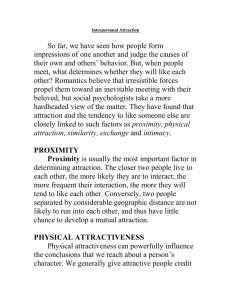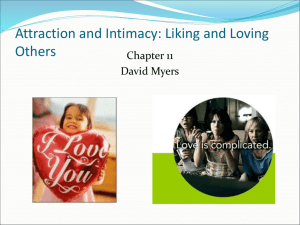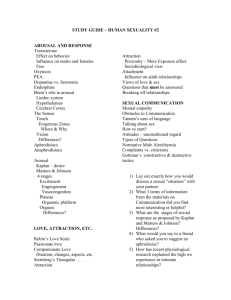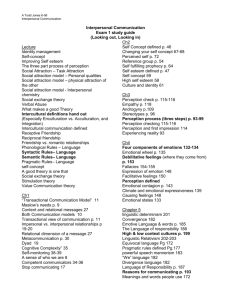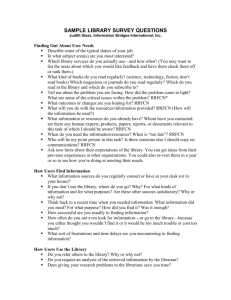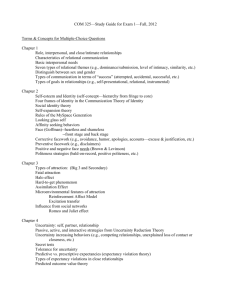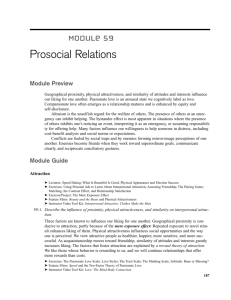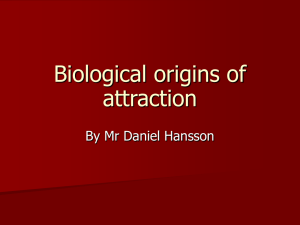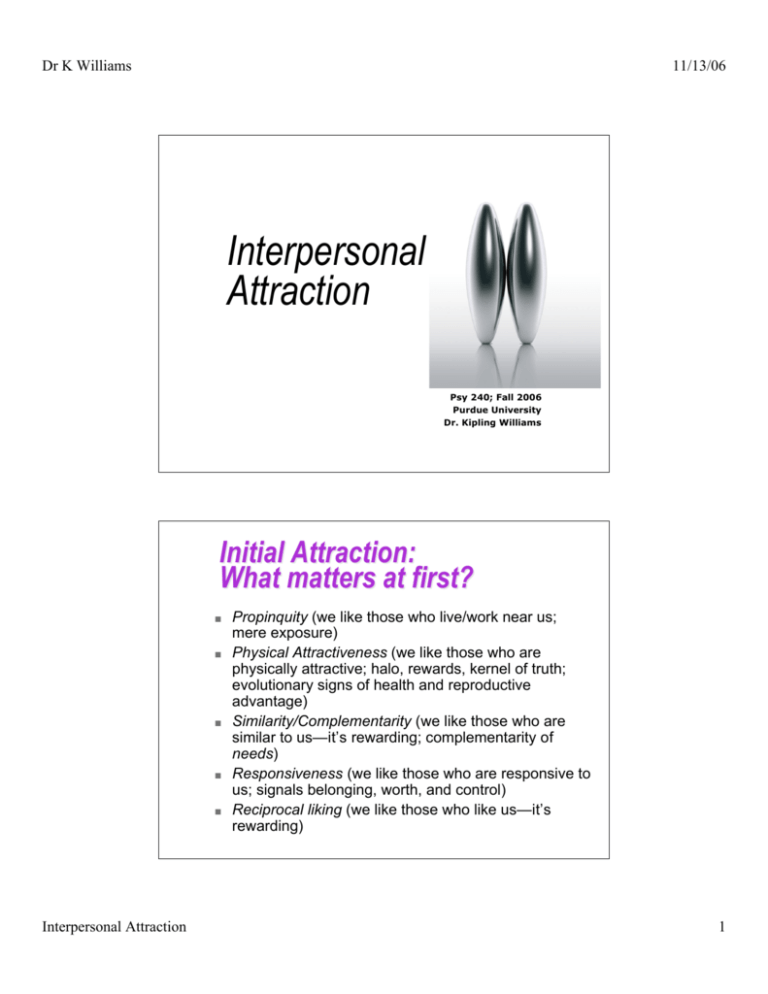
Dr K Williams
11/13/06
Interpersonal
Attraction
Psy 240; Fall 2006
Purdue University
Dr. Kipling Williams
Initial Attraction:
What matters at first?
Interpersonal Attraction
Propinquity (we like those who live/work near us;
mere exposure)
Physical Attractiveness (we like those who are
physically attractive; halo, rewards, kernel of truth;
evolutionary signs of health and reproductive
advantage)
Similarity/Complementarity (we like those who are
similar to us—it’s rewarding; complementarity of
needs)
Responsiveness (we like those who are responsive to
us; signals belonging, worth, and control)
Reciprocal liking (we like those who like us—it’s
rewarding)
1
Dr K Williams
11/13/06
Propinquity
Festinger, Schachter & Back (1959)’s “Social
pressures in informal groups: A study of
human factors in housing”
Zajonc’s (1968) “Attitudinal effects of mere
exposure” (JPSP)
“Mirror exposure” - we like our reflection view
better than the view that others see of us; and
vice versa.
Moreland & Beach’s (1992) “Exposure effects
in the classroom…” (JESP)
Physical Attractiveness
Walster, Aronson, Abrahams & Rottman, 1966: Computer
Dating paradigm
Take a battery of measures of
Interpersonal Attraction
personality
SES
interests
physical attractiveness
Randomly pair college students with person of opposite
sex.
Asked them to rate their date
Only one factor predicted liking and intention to ask out
again…physical attractiveness (for males & females!)
How about after the fifth date? (Mathes, 1975)
2
Dr K Williams
11/13/06
Physical Attractiveness
How ubiquitous?
In the courtroom
less likely to be found guilty; if guilty, lighter
sentence (except if used to commit crime)
In job applications
More likely to be hired even for jobs in which
appearance could have no conceivable
relationship to job performance
Class project (High, Med, Low Phys Attractiveness
X High, Med, Low Qualifications)
• Which matters most?
Physical Attractiveness
How ubiquitous?
With children
Interpersonal Attraction
They are more popular, better
liked by parents, teachers,
and peers.
Dealt with less severely if
they commit a transgression
Teachers give them more
information, better
evaluations, more
opportunities to perform, and
more support for their
educational endeavors.
3
Dr K Williams
11/13/06
Physical Attractiveness
How ubiquitous?
With infants
Langois, 1991 infants (6 month
olds) smile more at
attractive than
unattractive photos
of adults (regardless
of race of child and
race of photo)
and, the other way
around...
Physical Attractiveness
Explanations:
Interpersonal Attraction
Learning - we are taught that what is beautiful is good. Good
witches are pretty; bad witches are ugly...
Halo effect - we are attracted to the positive characteristics
associated with physical attractiveness.
Kernel of truth - attractive people have higher self-concepts,
better mental health, are more assertive and more confident.
Preferred even on telephone!
Rewarded by association - if we are with a physically
attractive person, we’ll be rewarded, too
Evolutionary Psychology - We are attracted to that which is
evolutionarily related to reproductive success and successful
rearing of the children. Physical attraction matters with lower
animals, too.
4
Dr K Williams
11/13/06
Physical Attractiveness Stereotypes
What are they?
Different for cultures (Wheeler)
Western cultures (high in individualism) attribute
potency to physically attractive people (assertive
and dominant)
Eastern cultures (high in collectivism and group
harmony) attribute high concern for others and
integrity to attractive people
But, there are stable factors
Waist-to-hip ratio: ~.75 (25in waist; 34inch hips or
63cm hips to 86cm waist)
Men also prefer neotenous (child-like)
characteristics in women. Why?
Singh’s waist-to-hip
ratio
Interpersonal Attraction
.67 - .80 (hips roughly a
third
larger than the waist)
more likely to be healthy
health is predictive of
reproductive success
5
Dr K Williams
11/13/06
Neoteny is a desirable facial
characteristic
Youthful = Reproductively Healthy?
Other stable characteristics of
physical attractiveness
Men prefer “neotenous”
charactertistics in females
baby-like features
Interpersonal Attraction
Women, on the other
hand, tend to prefer Vshape in men
round mouth, full lips, big
eyes
6
Dr K Williams
11/13/06
Similarity/
Complementarity
Byrne (1971) “The attraction
paradigm” - We like those who
believe what we believe
Similarity-attraction or dissimilarityrepulsion (Rosenbaum, 1986)
When do opposites attract? Need
complementarity
Responsiveness
Interpersonal Attraction
Rats like responsive rats
(Latane)
People like responsive
people (Davis, Bernieri)
Chartrand (nonconscious
mimicry)
7
Dr K Williams
11/13/06
Reciprocal liking
We like people who like us. We also…
comply more
help more
attribute more positive characteristics to
and judge their actions more favorably
Love & Lust
Interpersonal Attraction
Do short-term influences
affect long-term liking
and love?
Are there other factors
and issues that make
long-term attraction
worth studying?
8
Dr K Williams
11/13/06
Short-Term Mate Selection
Males are more likely to report that they
would enter into a short-term sexual
relationship than are females.
The sexes are more similar in what they
prioritize in their partners for such
relationships.
Five studies (Li & Kenrick, JPSP, 2006)
Men and women given “mate
budgets” to design short-term mates,
and asked whether they would
actually mate with their constructed
partner.
Mate screening paradigm
Reported reasons for having casual
sex.
Sex Differences in Short-term mating
Whether to enter into a short term sexual relationship?
Men have lower thresholds for entering into short-term
mating relationships
More willing than women to engage in sexual relations after
any length of acquaintance
Interpersonal Attraction
1 hr to 5 yrs
75% say “yes” to opposite sex strangers proposal for casual
sex; 0% for women (Clark & Hatfield, 1989)
Both have high standards for long-term partners, but men
lower their standards for short-term partners (especially onenight stands).
Why?
9
Dr K Williams
11/13/06
Sex Differences in Short-term
mating: Why?
Cultural factors
Societal norms influence men to be more agentic and women to
be more passive across all behaviors, including sex
Cultural double-standard, with promiscuous sexuality more
acceptable for men than women
But recent research suggests these differences in acceptability
are closing
Evolutionary factors
Minimum obligatory parental investment (Trivers, 1972)
Men are physiologically required to contribute only a few sex cells to
offspring, women must provide substantial pre- and postnatal
resources if offspring are to survive
Short term mating has higher cost-to-benefit ratio for women than
men
Short-term casual sexual relations
What characteristics are valued?
A strong preference for physical attractiveness for both sexes; it is
more important as hypothetical relationship becomes shorter
High status/resources least important (physical attractiveness and
warmth/trustworthiness more important).
Is physical attractiveness regarded as a necessity or luxury
Necessity: an item that is initially desirable but, once obtained in
sufficient quantity, yields to other items
Luxury: Becomes important once sufficient levels of necessities
have been obtained
Interpersonal Attraction
By using forced choice method, Li & Kenrick concluded that
physical attractiveness was a necessity for both males and
females for short-term partners
10
Dr K Williams
11/13/06
How they Budgeted “Mate Dollars”
Study 1 (Li & Kenrick, 2006)
Women
Men
Physical Attractiveness
40.80
52.30
Social level
20.20
13.30
Creativity
6.10
6.00
Kindness
17.10
13.70
Liveliness
15.80
14.70
The Role of Arousal
Feelings that include arousal or
passion go beyond simple liking.
Arousal is relatively
undifferentiated
arousal
label
Interpersonal Attraction
11
Dr K Williams
11/13/06
Lust on a Bridge
Dutton,& Aron (1974) JPSP
BC, Vancouver, Canada,
a high suspension bridge over a
river.
There is also a Low sturdy wooden
bridge over the same river
Misattribution of Arousal
Relevance and Applications
Sternberg’s Triangular
Theory of Love
Sternberg (1986), Psych Review
Intimacy
Passion
closeness, bondedness,
connectedness. Sharing of inner thoughts and
feelings.
arousal, sexual attraction
Decision/Commitment
short-term decision that one loves the other
long-term commitment to maintain the loave
Interpersonal Attraction
12
Dr K Williams
11/13/06
Sternberg’s Triangular Theory of Love
Eight combinations:
Nonlove (absence of all three) - casual interactions
Liking (intimacy only) - in absence, miss, but not dwell
Infatuated love (passion only) - love at first sight; easy for others to
spot
Empty love (decision/commitment only) - found in stagnant
relationships
Romantic love (Intimacy & passion) - liking and being ‘turned-on”
by the other
Companionate love (Intimacy & Decision/Commitment) - long-term
committed friendship after passion fades
Fatuous love (Passion & Decision/Commitment)- “Hollywood”
romance; burns out quickly
Consummate love (all three) - difficult to maintain, must work at it
Sternberg’s Triangular Theory of Love
What predicts a “successful relationship?”
Doesn’t have to be consummate love
Both people don’t have to “match” on what they
belief love to mean to them
But, what does predict success, is that the partner’s
conception of love matches what s/he thinks is the
other partner’s conception of love
This is nice--it’s an “other-oriented” factor of love,
rather than a “self-oriented” factor.
Interpersonal Attraction
13

